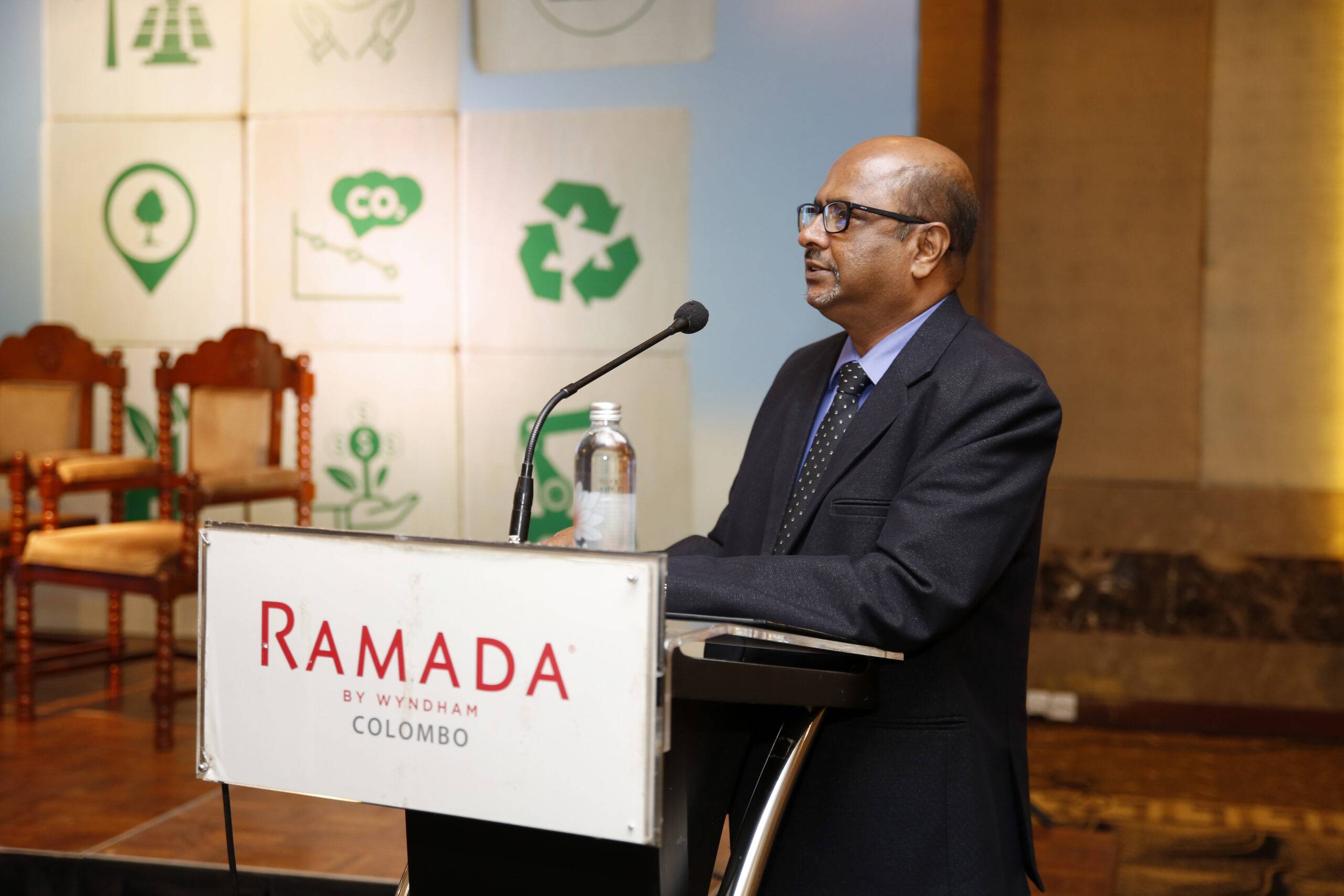
Fresh Thinking, New Solutions: Ways To Fight Climate Change – Featuring The Keynote Presentation At Bsl’s Ceo Forum
Our CEO Forum was held on 3rd November 2022 at Ramada Colombo in the aftermath of its 7th AGM. Representatives from over 90 renowned private sector companies participated in the event. The keynote speech on the topic ‘Fresh Thinking, New Solutions: Ways to Fight Climate Change, was delivered by Dr. Ranjith Punyawardena, Chairman, National Steering Committee on Climate Change Adaptation, Ministry of Environment, Sri Lanka & Former Principal Scientist (Argo-Climatology)- Department of Agriculture, Sri Lanka.
Dr. Punyawardena commenced his speech on an interesting note, indicating the disappearance of glaciers on Mount Kilimanjaro from 1912, 1970, 2000, and 2006, as pictured by the Swedish Chemist Svante Arrhenius. He also explained how the greenhouse effect, global warming & climate change has had a drastic adverse impact on temperatures, also mentioning how the last 7 years are ranked as the top 7 hottest. He then defined the terms ‘Climate Variability’ & ‘Climate Change’ by indicating adaptation or resilience building for natural climate variability carried out through the Village Tank Cascade System in the Dry and Intermediate Zones of Sri Lanka, harnessing the potential of reliable climatic regime and terrain through the Village Anicut Systems in the Wet and Intermediate Zones of Sri Lanka.
Dr. Punyawardena next highlighted the salient features of climate change in Sri Lanka, which is the slow and continuous rise of ambient temperature, especially the nighttime minimum temperature and heat stress. He also highlighted the future climate of Sri Lanka according to the AR5 RCP 4.5 Scenario (mean across all 3 climatic zones) and trends of Summer Monsoon (SWM) and Winter Monsoon (NEM), following which he explained the options available for combatting the climate crisis – adaptation, mitigation or no actions.
The world is warming faster than at any point in recorded history. Several important events have occurred during the past years, such as the temperature rising by 0.08oC per decade since 1880, and the rate of warming is increased by more than twice (0.18oC per decade) since 1981. 2021 has been the sixth-warmest year on record. Thereby, Dr. Punyawardena highlighted the need to reduce global warming through new solutions or Nationally Determined Contributions (NDCs), which is a climate action plan of a country to cut emissions and adapt to climate impacts in order to ensure a safer future below the 1.5oC threshold. He then explained in order to ensure a safer future below the 1.5oC threshold, it requires the world to cut 30 Gg GHG emissions annually by 2030. Therefore, the Paris Agreement/UNEP has identified the 6-sector solution, which can reduce 29-32 Gt CO2e and limit temperature rise to 1.5oC; Energy – 8.2 Gt, Industry – 5.4 Gt, Agriculture, Food & Waste – 6.7 Gt, Nature-based climate solutions – 5.9 Gt, Transport – 4.7 Gt and Building & Cities – 5.9 Gt. Finally, he briefed on Sri Lanka’s commitment to NDCs, to reduce GHG emissions by 14.5% by 2030, including an unconditional reduction of 4%, establishing 2030 targets to achieve 70% renewable energy in electricity generation while no further increase in the capacity of its coal power plants and also Sri Lanka expecting to achieve Carbon Neutrality by 2060 while Carbon Neutrality in electricity generation by 2050. He also explained the Mitigation NDCs and Adaptation NDCs of Sri Lanka.
As an ending note, Dr. Punyawardena mentioned some points for serious consideration such as the political commitment to climate actions, and the availability of an effective and inclusive engagement process in place to ensure that society accepts and adopts the proposed NDCs. He opined, are we ready with a strong supporting and coordination mechanism to ensure effectiveness and efficiency of NDC implementation, while avoiding overlaps during the process, are there any conflicting issues or synergies between post- Covid 19 recovery plans and Climate Actions, and trends of Sri Lanka’s GHG Emissions by Sector (Energy, Waste, Land-Use Change and Forestry, Agriculture & Industrial Processes) and Percent of Total Emissions for reflection by the participants.
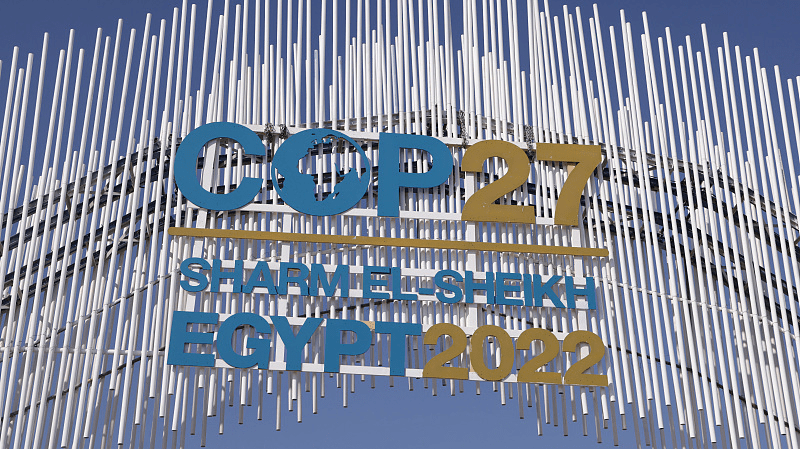
UNFCC-COP27: Loss-and-damage fund victory undermined by fossil-fuel omissions
How much Sri Lanka stands to benefit from the developments at COP 27 is yet to be seen as much is to be ascertained at COP 28 and the year of secondary negotiations that will precede it. In summary COP 27 established a loss and damage fund, amped up technology based solutions to climate change, and added focus on climate finance but failed to make real progress where emissions were concerned and set more ambitious goals on the 1.5 degree Celsius target and fossil fuels.
The COP27 summit was held with the assembly of countries reaching an agreement on a loss and damage fund. According to Kumudini Vidyalankara, Director of Sri Lanka’s Climate Change Secretariat, a fund was established and a transition committee was appointed to design a mechanism through which the fund would be operationalized.
The appointed committee holds responsibility for whom will be entitled to receive funding, who will have to pay etc. The recommendations are to be presented to COP28, which will be held in United Arab Emirates in 2023. However, Ms. Vidyalankara mentioned experts claiming that it will at least take five years before any money is mobilized. But she also said that vulnerable countries like Sri Lanka will be prioritized.
Yet, the final cover text has been receiving mixed comments as it addresses the results of climate change, but not the cause, which is fossil fuels. Catherine Abreu, Executive Director of Destination Zero has tweeted, that it is unfortunate that UN climate talks have failed to live up to the science, “which is clear that climate action = fossil phase out”.
The final cover text has no indication about oil or gas, and the references to coal and fossil fuel subsidies are filled with qualifiers and loopholes. The treaty, for which is gaining boost, will be functioning as a separate but supporting legal mechanism to end the growth of fossil fuels and manage a transition from coal, oil and gas production. Even the United Nations Framework Convention on Climate Change (UNFCCC), being a critical mechanism for international climate policy, has not facilitated the International Corporation on fossil fuel supply required to manage the global transition.
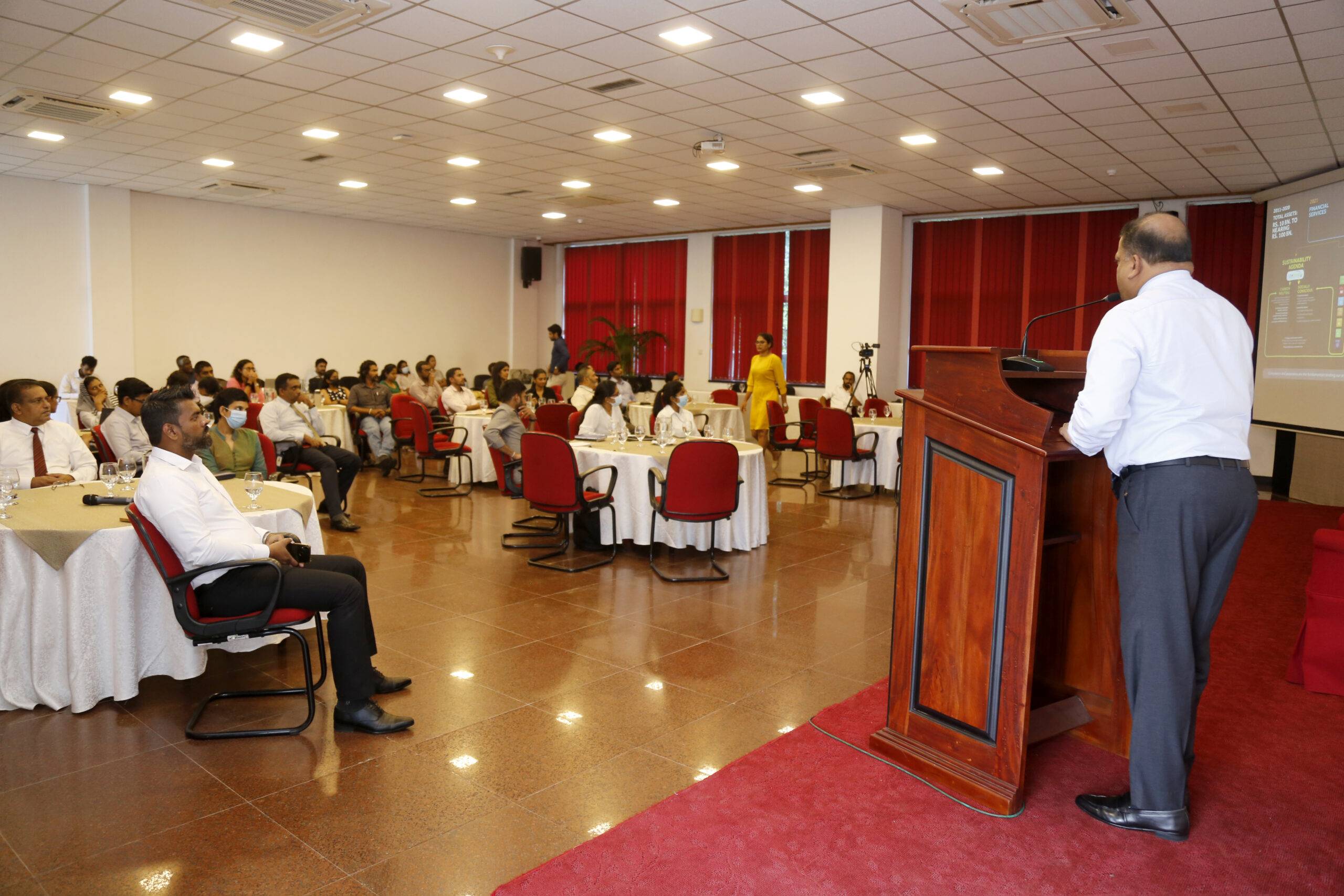
BSL and IUCN present a Succession Plan for LIFE – Kanneliya at its Annual Technical Session 3
BSL and IUCN shared the plan for the continuation of the LIFE Kanneliya project for a further 5 years. In the continuation phase, much of the focus will be on facilitating ecological succession. In addition, monitoring activities will be carried out to measure progress made in ecological succession. All partnering companies were invited to continue supporting the LIFE Journey to ensure that the site is a fully functional ecosystem in the long run.
Under the theme of “be a part of breathing new life into reality”, with the enthusiastic participation of over 75 members and invitees, as a part of its Annual Technical Sessions, BSL conducted an event to demonstrate successful examples of ecological restoration with particular emphasis on its LIFE – Kanneliya Project on November 2, 2022, at the Bandaranaike Centre for International Studies. This was the 3rd segment of BSL’s Annual Technical Sessions – 2022/23.
At the outset, Mr. Mahesh Nanayakkara, Director of Biodiversity Sri Lanka & CEO, of Citizens Development Business Finance PLC (CDB), enlightened participants on the Value of Building Partnerships in Conservation (SDG 17). He provided some great examples from the CDB portfolio where partnerships have contributed to advancing the Bank’s conservation agenda. He reiterated the point that the LIFE partnership is unique as it consists of over 14 corporate partners some of which are competitors in the market. Renowned scientist, Dr Rohan Pethyagoda shared his story of a quarter century of experience in restoring montane forest ecosystems in Sri Lanka. A documentary video on the LIFE Project was launched at the event for the benefit of participants. Prof. Devaka Weerakoon, Technical Expert of the LIFE Project, and Naalin Perera, Project Manager, IUCN Sri Lanka eloquently presented the results of the LIFE Project’s restoration efforts.
Our LIFE Journey commenced in 2016 with fifteen private sector companies coming together with Biodiversity Sri Lanka, to restore a 12-ha patch of degraded forest land in the Kanneliya Forest Reserve, under the able guidance of the Forest Department, with technical support of the International Union for Conservation of Nature (IUCN). The current phase is now in its 5th year of implementation. The site is best described as a degraded rainforest, cleared for cultivation and subsequently abandoned resulting in the colonization by the pioneer fern species Dicranopteris linearis (Kekilla). This highly degraded patch will be restored using principles of restoration ecology to enhance its ecological functions, habitat quality, species diversity, and its capacity to provide biodiversity and ecosystem services – in a close approximation to what prevailed before it was converted to its present state. The project will develop a biodiversity credit accrual system for Sri Lanka with the objective of assigning a unit value for enhanced biodiversity and ecosystem services.
After years of astute planning, rigorous implementation, and monitoring, despite multiple challenges, the site has shown remarkable progress. At the culmination of the fourth year of field implementation, in April 2022, over 18,000 plants from 46 native species have been introduced including Hora, Wal Del, Bata Domba, Alu bo, Naa, Pelan, and Diyapara. Native shrub species of Maha bovitiya and Veraniya have emerged naturally after the systematic removal of the invasive Kekilla. Exotic species such as Alstonia have been observed alongside the native shrub species. Despite, Alstonia being invasive, it will be maintained at the site to obtain shade and to increase the soil carbon levels. Some of the naturally occurring pioneer plant species include Milla, Kekuna, Kenda, and Geduma.
Several new animal species, which were not recorded during the initial baseline study, are now on-site. The Brown shrike (Lanius cristatus), Jungle nightjar (Caprimulgus indicus), and the Ceylon frogmouth (Batrachostomus moniliger) naturally occurring in scrublands and shrub jungles, now call the site their home. Some areas have reached the second and third succession stages of forest regeneration, containing shrubs and small trees. This new succession structure attracts animal species, which play a significant role as seed dispersants. A massive total of 90 animal species have been recorded to date. This includes 4 species of land snails, 9 species of dragonflies, 14 species of butterflies, 6 amphibian species, 12 reptile species, 35 avian, and 10 mammal species.
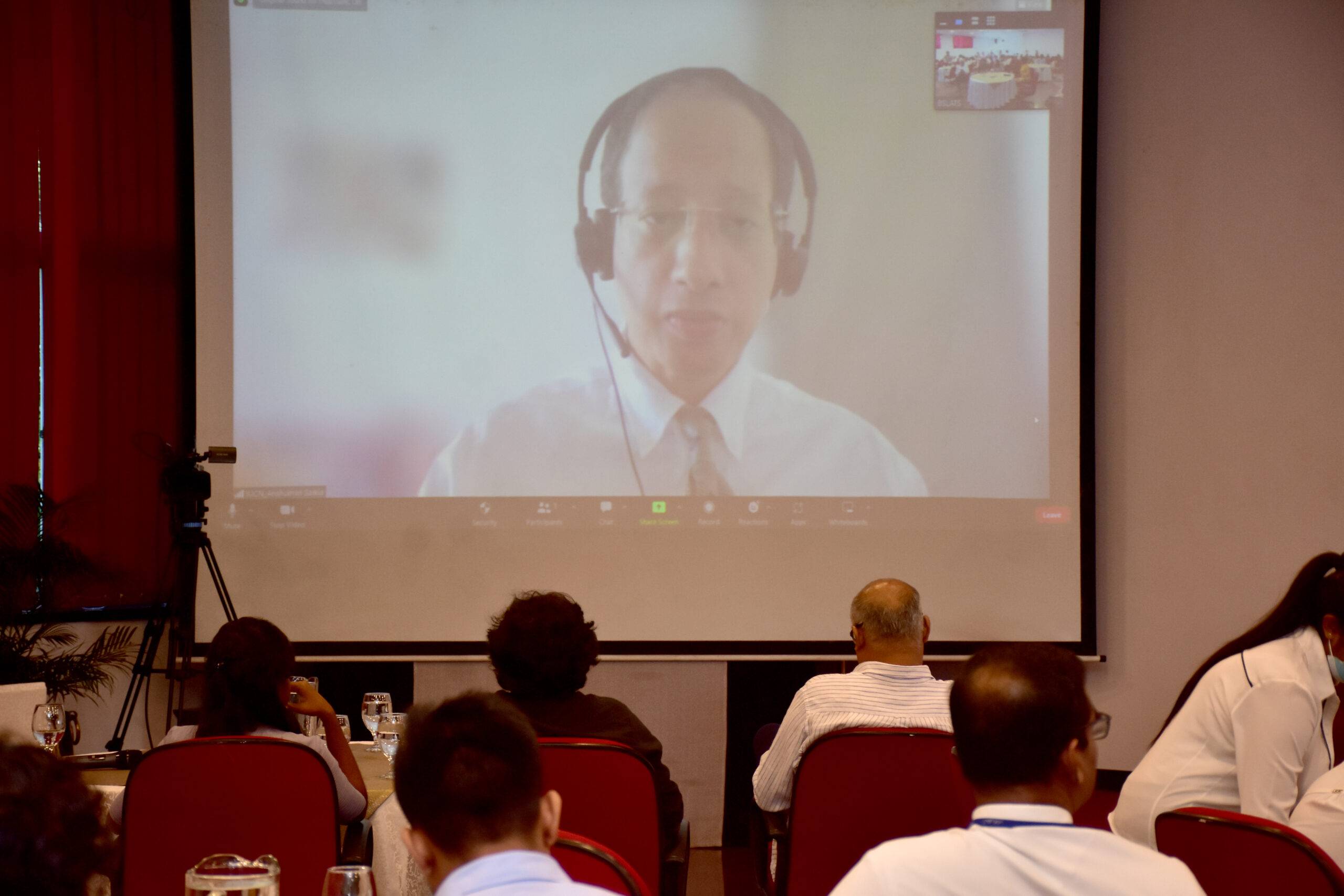
Annual Technical Session 2: Aligning business action with Post-2020 Global Biodiversity Framework & 2030 Action Targets
Over the last two years, we have seen significant engagement from 1,100 companies that are advocating for a nature-positive world, and hundreds of leading companies making commitments and applying available tools and data to help implement and deliver the relevant targets included in the Post-2020 Global Biodiversity Framework (GBF). There are more targeted resources on the way to support business implementation, such as the Science Based Targets Network (SBTN) and the Taskforce on Nature-related Financial Disclosures (TNFD).
The Convention on Biological Diversity’s Conference of Parties 15 (COP15) is now set to take place at the headquarters of the Secretariat of the Convention on Biological Diversity (SCBD) in Montreal, Canada from 5 to 17 December 2022. Member states will adopt the Post-2020 (GBF) at COP 15, which will hopefully provide a clear direction and strong signal on the need to halt and reverse nature loss by 2030. Based on Target 15 – Role of business, there has been significant momentum in favor of mandatory requirements for businesses and financial institutions to assess and disclose their impacts and dependencies on nature. The need for businesses and financial institutions to reduce their negative impacts on nature by at least half and increase positive impacts has also been supported by many countries during the negotiations but will need further discussion in Montreal.
The session engaged with experts to discuss road maps that break down what nature-positive means for a business to help companies understand what nature-positive means for their sector and break down key actions businesses need to consider to address nature loss. These Roadmaps include guidance on assessing dependencies, measuring impacts, and tracking efforts to halt and reverse nature loss across the value chain.
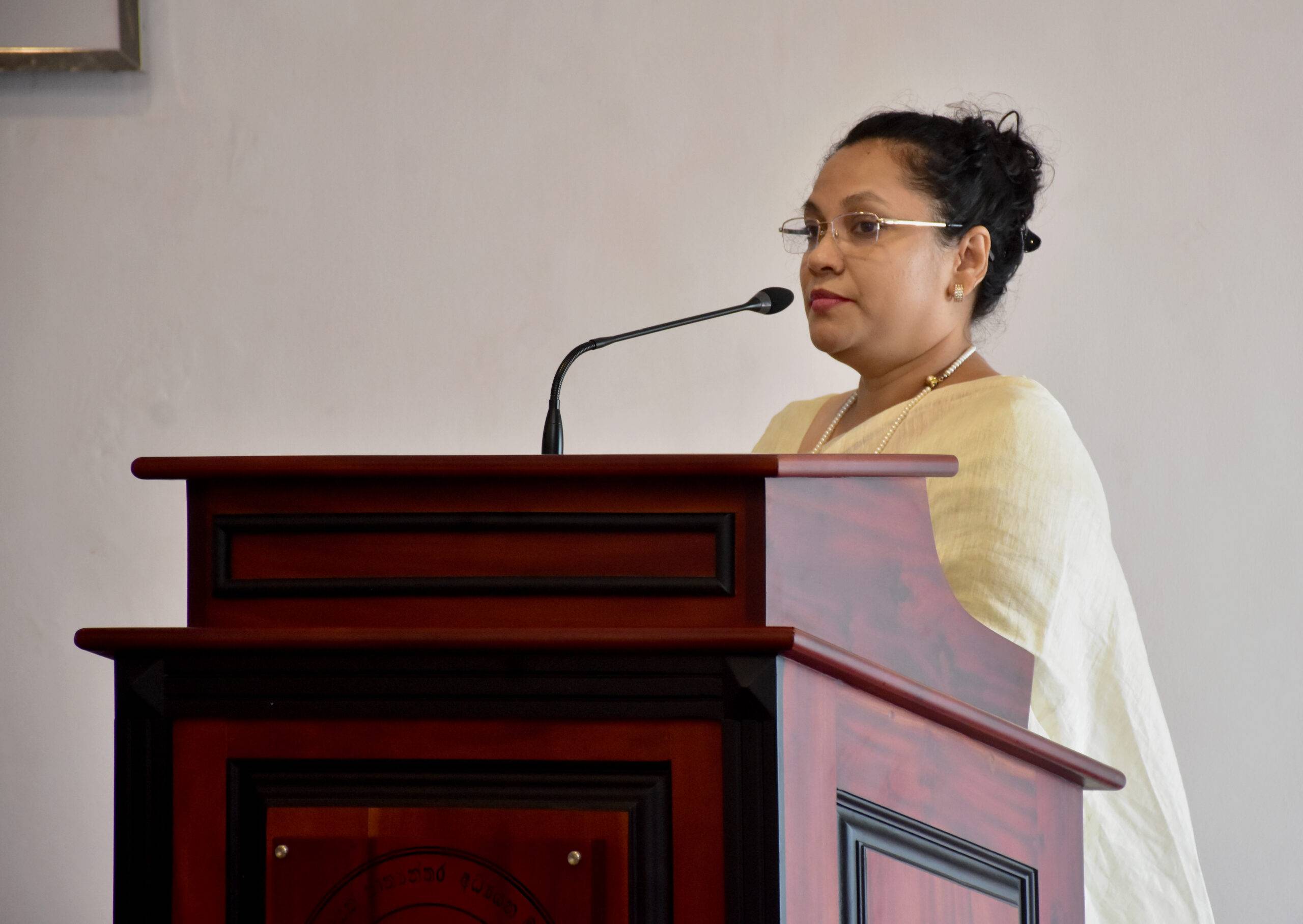
BSL Technical Session 1: Innovative Financing Mechanisms For SDG Implementation In Sri Lanka
The keynote speech on the topic ‘Inclusive Transformation towards a sustainably Developed Nation for All’, was delivered by Ms. Chamindry Saparamadu, Director General/CEO, Sustainable Development Council of Sri Lanka.
In her speech, Ms. Saparamadu discussed the current position of Sri Lanka, in terms of the progress of the Sustainable Development Goals (SDGs) implementation, within the past 4 years (from 2019 to 2022) and the policies aligned with SDGs. The flagship strategies, programs, and achievements aligned with SDG implementation were highlighted, emphasizing the rise in fisheries exports during the past 10 years, taken as an example of diversifying the economy. The SME Policy Framework Matrix was brought forward, by indicating the Policy Vision, Policy Mission, and Policy Objective. Details on Knowledge Economy were explained by elaborating on the decade of Skills Development: 2021 – 2030. The Blue green economy was highlighted as a vision for a low Carbon Future and revolutionizing waste management by the Nitrogen Waste Management Policy on Sustainable Consumption and Production. The next point discussed was the Technology driven Transformation, indicating the improved position of Sri Lanka’s ranking according to the E-Government Development Index and the roadmap for Government Digitalization taken into consideration.
Ms. Saparamadu also discussed Social Inclusivity, indicating the emergency cash transfer measures introduced by the GoSL in response to the impacts of COVID-19 and the Maternal Mortality, Neo-Natal Mortality, and Under-five Mortality Ratios. Strengthened Law Enforcement and Rights Protection were emphasized thereafter. The challenges to be faced, such as twin deficit, data gaps for targeted and evidence-based planning, and policy incoherence and institutional fragmentation were discussed hereto.
The best way to move forward was explained by Ms. Saparamadu, as addressing systematic and structural issues that impede SDG progress, Mobilizing Financing for SDGs, such as debt restructuring, sustainable and innovative financing, etc. The keynote speech ended with Key Initiatives for Mobilizing Resources for a Sustained Transformation, recommending publications from the Central Bank of Sri Lanka, such as ‘Roadmap for Sustainable Finance in Sri Lanka’ and ‘Sri Lanka Green Finance Taxonomy’.
The Sri Lanka SDG Investor map was introduced as a final note, by indicating its development process and the IOAs mapped to priority sectors such as Renewable Energy, Food and Beverages, Infrastructure, Healthcare, and Consumer Goods.
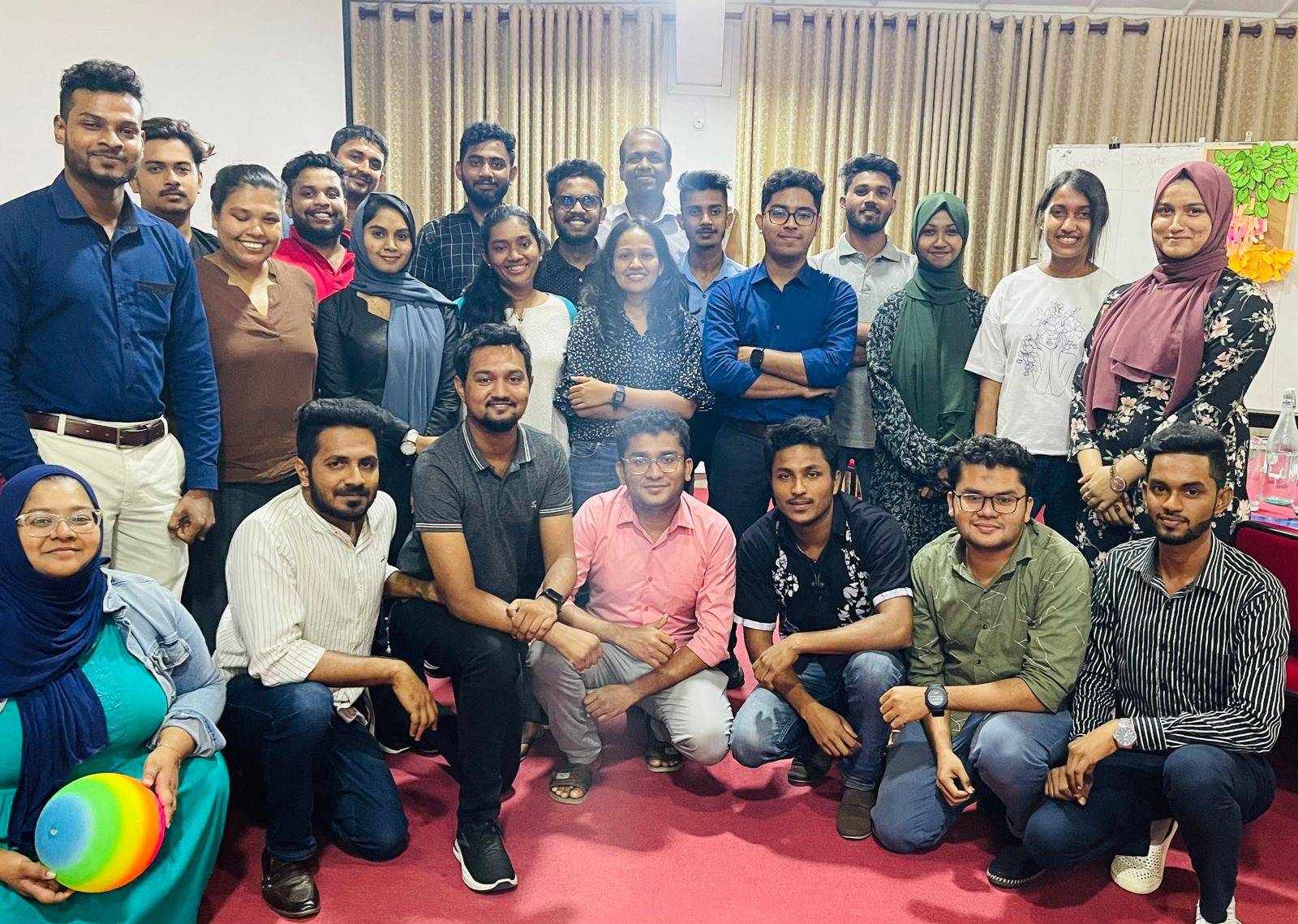
Youth Leadership for Climate Action (YLCA)
Biodiversity Sri Lanka (BSL) is carrying out an initiative called Youth Leadership for Climate Action (YLCA), targeting young people living in the Colombo district. The British Council is funding this program to develop young people into community leaders in climate action. The project includes a residential training program; either individually or in groups, the candidates must undertake a community intervention. BSL and CurveUp (Pvt) Ltd., are conducting the training sessions collaboratively.
Climate change is a significant issue for Sri Lanka and both human and natural systems could be impacted by its effects. In Sri Lanka, there are about 2.6 million young people, between the ages of 18 and 25 A quarter of the entire population would be considered young if the age range was expanded to include those between 15 and 29 years.
The British Council conducted a study in 2021 and discovered that while young people in Sri Lanka are generally aware of climate change, the majority lack a technical understanding and in-depth knowledge of the subject. The survey also found a lack of opportunities and platforms for youth to take initiatives and make decisions on climate change, as well as a lack of openness among state and non-state community stakeholders to up-take initiatives from young people.
As Sri Lankan youth showed a strong interest in learning more about climate change, the majority of them think that their thoughts and actions today will have an impact later on. This suggested that both governmental and non-governmental actors might engage with young people, enhance climate-related education and training, and offer them chances to take climate action.
In partnership with the British Council, BSL is giving a chance to Sri Lankan youth involved in local climate action (mitigation and adaptation) to expand their knowledge, expertise, and networks in order to provide better, more significant, and sustainable solutions to urgent social, economic, and environmental climate-related issues by involving local communities through the “Youth Leadership for Climate Action (YCA)” project.
YLCA project has its specific objective to enhance the knowledge and capabilities of youth for more effective and inclusive climate action through social mobilization.
The project will have four outcomes,
- Improved Knowledge, Skills and Connections of youth for community-level Climate action.
- Effective and Inclusive Climate Action Plans are developed and implemented by youth.
- Fellow youth are inspired and motivated towards favorable Climate action through shared experiences.
- Stakeholder support, collaboration, and recognition for youth Climate action.
This project is based in Colombo, and all youth community interventions are taking place in Colombo. Training for youth capacity-building is now being conducted, and the entire project will be completed by the end of March 2023.
Keep in touch with us for more updates on this fascinating program!
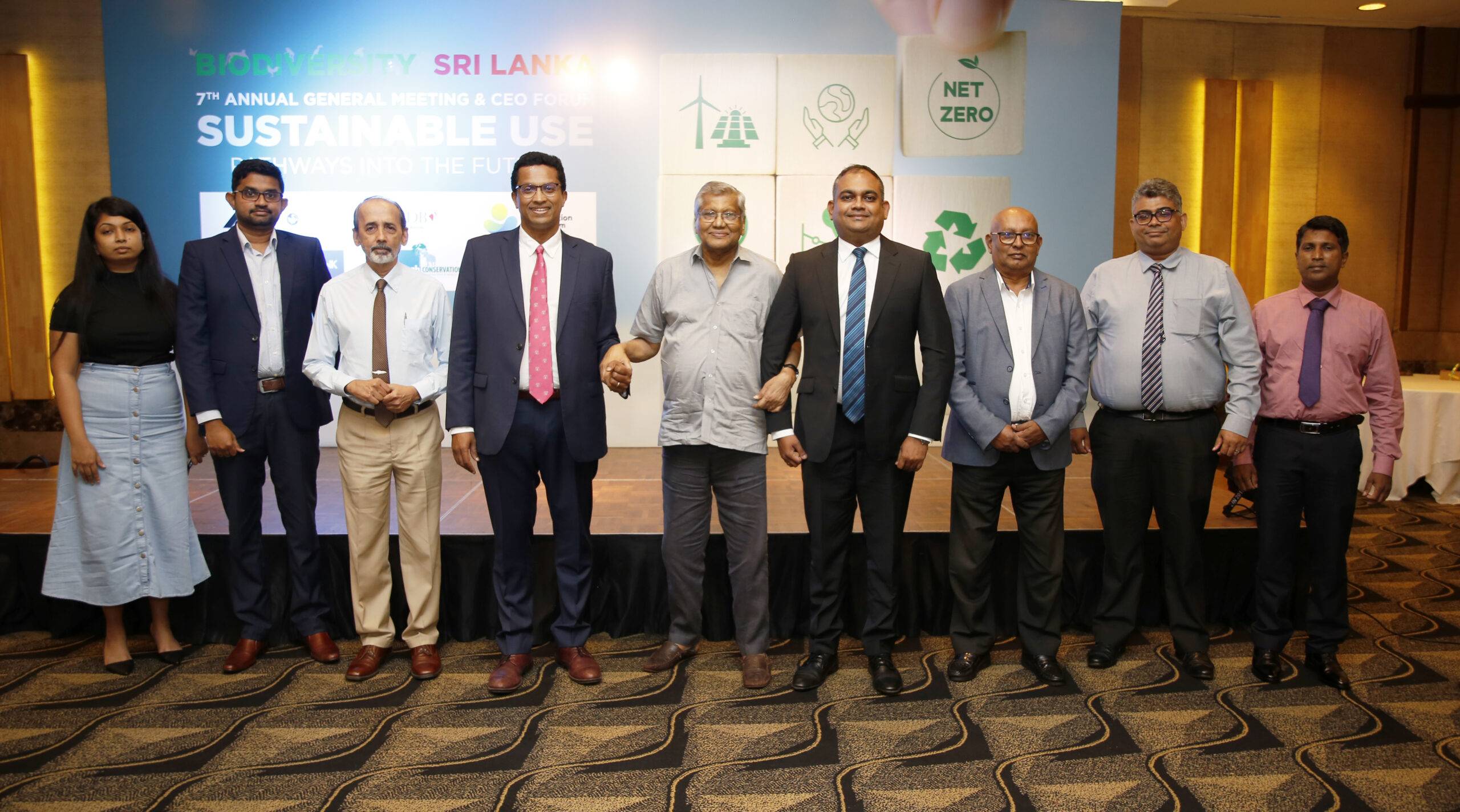
BSL holds its 7th Annual General Meeting
Biodiversity Sri Lanka held its 7th Annual General Meeting on November 3rd, 2022 at Ramada Colombo. The event was held physically after a two-year virtual hiatus due to the escalation of the COVID-19 pandemic.
At the meeting, a new Board of Directors was appointed. They are Mr. Dilhan C. Fernando, CEO of Dilmah Ceylon Tea Company and Trustee of Dilmah Conservation (Chair), Mr. Shiran Fernando, Chief Economist, Ceylon Chamber of Commerce, Mr. Anshuman Saikia, Coordinator, Regional Portfolio Management and Officer in Charge, IUCN Sri Lanka, Mr. Ranjith Pandithage, Chairman, DIMO, Mr. Hasrath Munasinghe, Deputy General Manager Marketing, Commercial Bank of Ceylon PLC, Ms. Sayuri Daluwatte, Group Chief Operations Officer, Jinasena (PVT) LTD. Mr. Lasitha Wimalaratne, Chief Executive Officer, HNB Assurance PLC. Mr. Prema Cooray, Chairman of Rainforest Ecolodge and a pioneer in the tourism and hospitality sector in the country, will continue to function as a Director/Chief Executive Officer. Dr. Rohan Pethiyagoda, Sri Lanka’s leading naturalist and taxonomist of freshwater fish of Sri Lanka was subsequently appointed as a Director being a person who has rendered outstanding service towards the fulfillment of the objects of the Association or who has proven expertise and/or standing in the field of business, sustainability and the environment in terms of Article 13.5 of the Articles of Association of BSL.
The Chairman, on behalf of the Secretariat, also took the opportunity to thank the outgoing members of the Board of Directors, including Mr. Nandana Ekanayake – Chairman of Siam City Cement (Lanka) Ltd., Mr. Mahesh Nanayakkara, Chief Executive Officer and Managing Director of Citizens’ Development Business Finance PLC., Mr. Shahid Mohomed Sangani, Director of Dynawash Ltd. and Mr. Subramaniam Eassuwaren – Deputy Chairman of Eswaran Brothers Exports (PVT) Ltd., for their outstanding service rendered towards the upliftment of the platform’s status, recognition, and effectiveness. Their services over the past two years have been of immense support and will no doubt be remembered and much appreciated over the years to come in this long journey we foresee.
Two of the past Directors who have served the platform diligently since its inception will no longer be with the board in the upcoming financial year. Dr. Ananda Mallawatantri retired from office as Country Representative of IUCN Sri Lanka in September 2022. He served on the Board, representing initiating partner IUCN from its inception. His untiring efforts towards the upliftment of BSL was recognized before the full membership of the Association.
Mr. Chandrarathne Vithanage, Senior Assistant Secretary General of the Ceylon Chamber of Commerce is also due to retire by the end of this year. He has been a strength from the inception of the Platform and has encouraged the staff in very many ways, giving them leadership in a number of initiatives that BSL has undertaken together with the CCC.
The former Secretary of the Ministry of Environment and present Secretary to the Prime Minister – Mr. Anura Dissanayake also left the board, in his capacity on the Board of Directors as a person who has rendered outstanding service towards the fulfillment of the objects of the Association with proven expertise and standing in the fields of business, sustainability and the environment. His current assignment as Secretary to the Prime Minister keeps him extremely busy in managing the country during these turbulent times and hence has requested that he be excluded from the Board of Directors for the next session.
The meeting was attended by a majority of BSL’s membership across all categories – Patron, General, SME and Associate. Sponsors of the event were American and Efird Lanka (Pvt.) Ltd., Citizens Development Business Finance PLC, Climate & Conservation Consortium, Commercial Bank of Ceylon PLC, Dilmah Conservation, and DIMO Lanka. Membership of BSL represents over 80 companies across 8 industry sectors, namely, agribusiness and food, banking and finance, engineering and construction, information and communications technology, manufacturing, service, tea plantations, and tourism and hospitality.
Established in August 2012, Biodiversity Sri Lanka was formally established as a not-for-profit company limited by guarantee on October 22, 2015, and has had a steady growth in membership up to date.



















